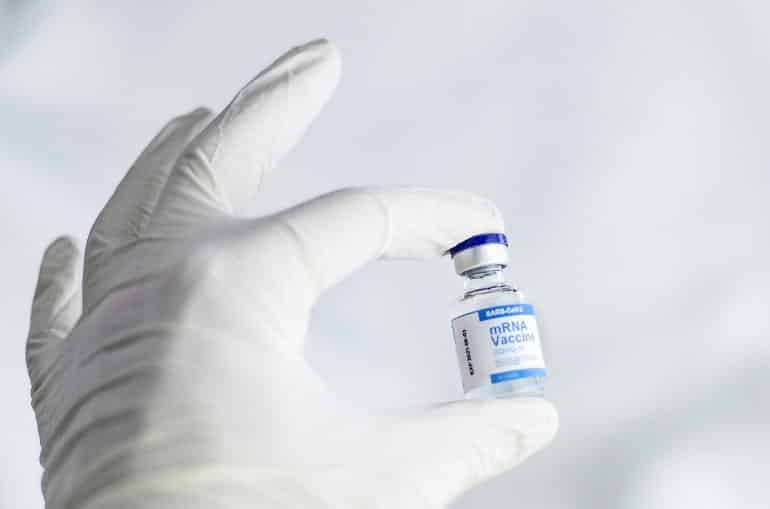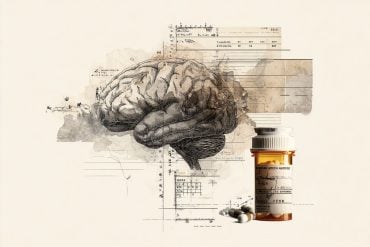Summary: A new study reports people with depression are 2.2 times more likely to endorse misinformation about the COVID-19 vaccine, and 2.7 times more likely to be vaccine-resistant. Additionally, rates of depression are three times higher than before the pandemic began.
Source: Mass General
A general bias toward negativity—or the tendency to focus on negative rather than positive information—may exacerbate the spread of misinformation. Because depression may contribute to such negativity bias, a team led by investigators at Massachusetts General Hospital (MGH) examined whether people who experience depressive symptoms may be more receptive to misinformation related to COVID-19 vaccines.
Their findings are published in JAMA Network Open.
“One of the notable things about depression is that it can cause people to see the world differently—sort of the opposite of rose-colored glasses. That is, for some depressed people, the world appears as a particularly dark and dangerous place,” says lead author Roy H. Perlis, MD, MSc, associate chief of research in the Department of Psychiatry and director of the Center for Quantitative Health at MGH.
“We wondered whether people seeing the world this way might also be more susceptible to believing misinformation about vaccines. If you already think the world is a dangerous place, you might be more inclined to believe that vaccines are dangerous—even though they are not.”
To investigate, Perlis and his colleagues examined responses from 15,464 adults from all 50 U.S. states and Washington, D.C., who completed an internet survey between May and July 2021 that included statements related to COVID-19 vaccines after answering a questionnaire that measured depressive symptoms.
The team found that levels of depression are at least three times higher than what they were before the COVID-19 pandemic. Participants with moderate or greater major depressive symptoms on the initial questionnaire were more likely to endorse at least one of four false statements about COVID-19 vaccines on the subsequent survey, and those who endorsed these statements were less likely to be vaccinated.
Specifically, the presence of depression was associated with a 2.2-times higher likelihood of endorsing misinformation, and respondents endorsing at least one misinformation statement were half as likely to be vaccinated and 2.7 times more likely to report vaccine resistance.

Perlis and his colleagues also analyzed data from the subset of 2,809 respondents who answered a subsequent survey two months later. Those with depression in the first survey were twice as likely as those without depression to endorse more misinformation than they did in the prior survey.
“While we can’t conclude that depression caused this susceptibility, looking at a second wave of data at least told us that the depression came before the misinformation. That is, it wasn’t that misinformation was making people more depressed,” Perlis notes.
Because the study also included questions about social media and news sources, the investigators were also able to exclude the possibility that the effect of depression was a result of getting news from different places. They also found that the effect was not limited to people with particular political beliefs or members of particular demographic groups.
The researchers note that the findings provide an additional motivation to ensure that people have access to treatment for depression and anxiety. “Our result suggests that, by addressing the extremely high levels of depression in this country during COVID, we might decrease people’s susceptibility to misinformation,” says Perlis. “Of course, we can only show an association—we can’t show that the depression causes the susceptibility, but it’s certainly suggestive that it might.”
Perlis stresses that the results in no way blame misinformation on people with depression but rather suggest that depression may cause people to be more vulnerable to believing this misinformation.
Co-authors include Katherine Ognyanova, PhD, Mauricio Santillana, PhD, Jennifer Lin, BA, James Druckman, PhD, David Lazer, PhD, Jon Green, PhD, Matthew Simonson, PhD, Matthew A. Baum, PhD, and John Della Volpe, BA.
Funding: This study was supported by the National Science Foundation, the National Institute of Mental Health, Northeastern University, Harvard Kennedy School of Government, and Rutgers University.
About this depression research news
Author: Noah Brown
Source: Mass General
Contact: Noah Brown – Mass General
Image: The image is in the public domain
Original Research: Open access.
“Association of Major Depressive Symptoms With Endorsement of COVID-19 Vaccine Misinformation Among US Adults” by Roy H. Perlis et al. JAMA Network Open
Abstract
Association of Major Depressive Symptoms With Endorsement of COVID-19 Vaccine Misinformation Among US Adults
Importance
Misinformation about COVID-19 vaccination may contribute substantially to vaccine hesitancy and resistance.
Objective
To determine if depressive symptoms are associated with greater likelihood of believing vaccine-related misinformation.
Design, Setting, and Participants
This survey study analyzed responses from 2 waves of a 50-state nonprobability internet survey conducted between May and July 2021, in which depressive symptoms were measured using the Patient Health Questionnaire 9-item (PHQ-9). Survey respondents were aged 18 and older. Population-reweighted multiple logistic regression was used to examine the association between moderate or greater depressive symptoms and endorsement of at least 1 item of vaccine misinformation, adjusted for sociodemographic features. The association between depressive symptoms in May and June, and new support for misinformation in the following wave was also examined.
Exposures
Depressive symptoms.
Main Outcomes and Measures
The main outcome was endorsing any of 4 common vaccine-related statements of misinformation.
Results
Among 15 464 survey respondents (9834 [63.6%] women and 5630 [36.4%] men; 722 Asian respondents [4.7%], 1494 Black respondents [9.7%], 1015 Hispanic respondents [6.6%], and 11 863 White respondents [76.7%]; mean [SD] age, 47.9 [17.5] years), 4164 respondents (26.9%) identified moderate or greater depressive symptoms on the PHQ-9, and 2964 respondents (19.2%) endorsed at least 1 vaccine-related statement of misinformation. Presence of depression was associated with increased likelihood of endorsing misinformation (crude odds ratio [OR], 2.33; 95% CI, 2.09-2.61; adjusted OR, 2.15; 95% CI, 1.91-2.43).
Respondents endorsing at least 1 misinformation item were significantly less likely to be vaccinated (crude OR, 0.40; 95% CI, 0.36-0.45; adjusted OR, 0.45; 95% CI, 0.40-0.51) and more likely to report vaccine resistance (crude OR, 2.54; 95% CI, 2.21-2.91; adjusted OR, 2.68; 95% CI, 2.89-3.13). Among 2809 respondents who answered a subsequent survey in July, presence of depression in the first survey was associated with greater likelihood of endorsing more misinformation compared with the prior survey (crude OR, 1.98; 95% CI, 1.42-2.75; adjusted OR, 1.63; 95% CI, 1.14-2.33).
Conclusions and Relevance
This survey study found that individuals with moderate or greater depressive symptoms were more likely to endorse vaccine-related misinformation, cross-sectionally and at a subsequent survey wave. While this study design cannot address causation, the association between depression and spread and impact of misinformation merits further investigation.







